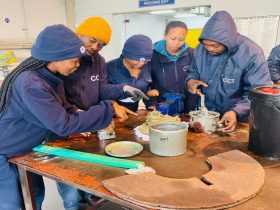In a first for Transnet, the Port of Durban will be partly owned and operated by the Philippines’ International Container Terminal Services. Allowing private sector participation in the Port of Cape Town has the potential to contribute an additional R6 billion in exports, roughly 20 000 direct and indirect jobs and over R1,6bn in additional taxes over five years according to research presented by the Western Cape’s Department of Economic Development and Tourism.
‘The development in Durban is massive, and it really opens the door for some exciting innovations for our own harbour. Cape Town is now even more determined than before to achieve the same for our port, and I will be calling for an urgent meeting with the Ministers of Public Enterprises and Trade and Industry to discuss this. We have willing partners to start working towards private sector participation in our port. We need to get the economic cluster in a room to talk business. We have no time to waste given the economic impact of our poorly run port.
‘Together with my provincial colleagues, I’ve been beating this drum for Cape Town for a very long time. As my business is talking to businesses, a common refrain I hear is ‘fix the harbour’. The door has been opened for Durban; now we want the same for Cape Town,’ said Alderman James Vos, Cape Town’s Mayoral Committee Member Economic Growth.
According to a presentation by Transnet in June to the Western Cape standing committee on finance and economic opportunities and tourism, the Cape Town container terminal is severely underequipped, with only 16 rubber tyre gantries available, which are needed to move cargo on and off ships. The optimal number should be 39. Additionally, while weather has had some role to play, there has been a notable decline in the Port of Cape Town’s performance across several indicators. Since the beginning of June 2023, the vessel waiting time at anchor averaged 4,6 days versus the target of one day; vessel turnaround time averaged 8,7 days versus the target of four days; and truck turnaround time averaged 64,5 minutes versus the target of 35 minutes.
‘I welcome the report released by the Western Cape government that recommends the appointment of a private service provider to operate the terminal. It further spells out that the port had the potential to contribute an additional R6bn in exports, roughly 20 000 direct and indirect jobs, and more than R1,6bn in additional taxes by 2026.
‘I am now more than ever determined to ensure the private sector is part of the conversation, including players like the Exporters Club. As soon as you get the private sector involved, there is fresh thinking, there are new ideas – and a completely different approach to the way we do business. It is always a good thing when the private sector steps up and is willing to become involved in managing key infrastructure.
‘For a country that relies on trade and exports, it is essential that goods are moved through the ports as efficiently as possible. Cape Town, at the southern tip cannot afford to have delays in our harbour, because companies will go to other ports if they experience too many hiccups.
‘We need to get the economic cluster of the state in one room, where we can sit down with each other, look each other in the eye, and talk business. We need to discuss what privatisation entails, who pays for what, and what the private sector contributions are and what is their say over operations. The government needs to understand that business is a crucial player when it comes to ensuring there are no interruptions in the value chain,’ said Alderman Vos.
























Leave a Reply